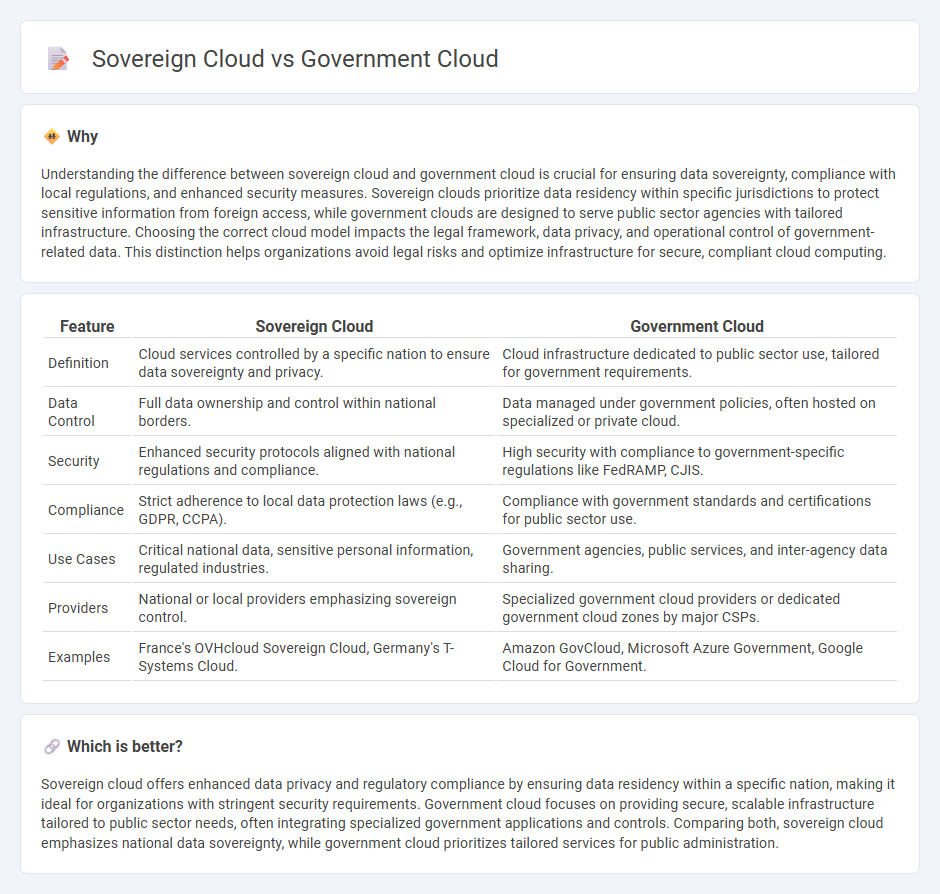
Sovereign cloud ensures data sovereignty by hosting information within a nation's borders, complying with local regulations and enhancing security for sensitive data. Government cloud focuses on providing scalable, secure infrastructure tailored specifically for public sector needs, often emphasizing cost efficiency and centralized control. Explore the distinct advantages of sovereign cloud and government cloud to determine the ideal solution for your organization's requirements.
Why it is important
Understanding the difference between sovereign cloud and government cloud is crucial for ensuring data sovereignty, compliance with local regulations, and enhanced security measures. Sovereign clouds prioritize data residency within specific jurisdictions to protect sensitive information from foreign access, while government clouds are designed to serve public sector agencies with tailored infrastructure. Choosing the correct cloud model impacts the legal framework, data privacy, and operational control of government-related data. This distinction helps organizations avoid legal risks and optimize infrastructure for secure, compliant cloud computing.
Comparison Table
| Feature | Sovereign Cloud | Government Cloud |
|---|---|---|
| Definition | Cloud services controlled by a specific nation to ensure data sovereignty and privacy. | Cloud infrastructure dedicated to public sector use, tailored for government requirements. |
| Data Control | Full data ownership and control within national borders. | Data managed under government policies, often hosted on specialized or private cloud. |
| Security | Enhanced security protocols aligned with national regulations and compliance. | High security with compliance to government-specific regulations like FedRAMP, CJIS. |
| Compliance | Strict adherence to local data protection laws (e.g., GDPR, CCPA). | Compliance with government standards and certifications for public sector use. |
| Use Cases | Critical national data, sensitive personal information, regulated industries. | Government agencies, public services, and inter-agency data sharing. |
| Providers | National or local providers emphasizing sovereign control. | Specialized government cloud providers or dedicated government cloud zones by major CSPs. |
| Examples | France's OVHcloud Sovereign Cloud, Germany's T-Systems Cloud. | Amazon GovCloud, Microsoft Azure Government, Google Cloud for Government. |
Which is better?
Sovereign cloud offers enhanced data privacy and regulatory compliance by ensuring data residency within a specific nation, making it ideal for organizations with stringent security requirements. Government cloud focuses on providing secure, scalable infrastructure tailored to public sector needs, often integrating specialized government applications and controls. Comparing both, sovereign cloud emphasizes national data sovereignty, while government cloud prioritizes tailored services for public administration.
Connection
Sovereign cloud and government cloud are interconnected through their focus on data sovereignty, security, and regulatory compliance tailored to meet national and governmental requirements. Both cloud models prioritize hosting sensitive data within specific jurisdictions, ensuring control over data residency and access. This alignment supports governments in maintaining autonomy, protecting citizen information, and adhering to local laws and policies.
Key Terms
Data Residency
Government cloud solutions typically offer secure infrastructure tailored for public sector needs, often hosted within national data centers to comply with data residency requirements. Sovereign cloud emphasizes strict control over data location, jurisdiction, and governance, ensuring data remains within a country's borders to meet regulatory and privacy mandates. Explore detailed comparisons to understand how data residency impacts cloud security and compliance frameworks.
Compliance
Government cloud ensures compliance with national regulations by providing secure, government-controlled infrastructure tailored to public sector requirements. Sovereign cloud extends compliance by emphasizing data sovereignty, ensuring data residency and strict adherence to local laws that protect sensitive information within particular jurisdictions. Explore the differences in compliance frameworks between government and sovereign clouds to determine the best fit for your organization's regulatory needs.
Control
Government cloud solutions offer centralized control and compliance tailored for public sector needs, ensuring data sovereignty within national boundaries. Sovereign cloud emphasizes even stricter control, often mandating data residency, local management, and regulatory adherence to protect national security interests. Explore deeper insights to understand which cloud model best secures your organization's data governance.
Source and External Links
Home | cloud.gov - cloud.gov is a secure, compliant Platform as a Service (PaaS) designed specifically for U.S. federal agencies to build, buy, and authorize modern cloud services with built-in compliance and security management, running on AWS infrastructure but open source for portability.
AWS GovCloud (US) - Amazon Web Services - AWS GovCloud is a compliant cloud platform operated by U.S. citizens on U.S. soil with FedRAMP High authorization, providing secure, scalable hosting for sensitive government data and mission-critical applications across physically and logically isolated regions.
Government Cloud - Salesforce - Salesforce Government Cloud offers a dedicated cloud environment for U.S. public sector organizations that ensures compliance with standards like FedRAMP High and DoD Impact Levels, helping government entities and contractors securely manage sensitive data while reducing compliance burdens.
 dowidth.com
dowidth.com